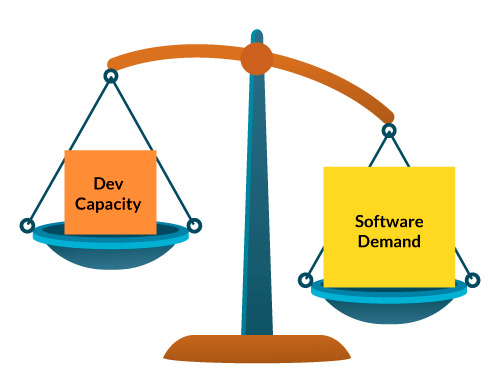
A lot is being talked about how organizations must encourage citizen development. Data goes to show that each year there is an increase in the percentage of citizen developers. These are people who don’t have a tech background and are building new applications and programs faster than ever. While this may seem like it’s a lot concerning the developers’ jobs, there is nothing to worry about.
If you are new to the term Citizen Developers, it broadly refers to people who are essentially not developers but can develop applications, usually with the help of simple visual interfaces that allow them to create what they want to see without having to learn a programming language. These are often solutions that need some solving within a department or with customers and would take more time to be processed by the IT department.
One powerful strategy that’s gaining momentum is encouraging citizen development—empowering employees to create their own solutions without needing deep technical expertise. By embracing citizen development, businesses can tap into the creativity and problem-solving skills of their workforce, fostering a culture of innovation that accelerates digital transformation. In this article, we’ll explore the key reasons to encourage citizen development at work and how it can unlock new opportunities for growth, efficiency, and productivity across the organization.
Also watch:
Source: Project Management Institute
Today, it is important to differentiate between what hard-core developers can achieve from their programs and what citizen developers can do to find more fast-tracked solutions. From creating custom solutions for specific customers to creating collaborations between IT and different teams, citizen development has come a long way since its inception. Further, while we don’t have the exact numbers in terms of how much more efficient citizen development does a business, it has proven to keep checklists moving, and we will be talking about these sorts of benefits here.
Why Citizen Development is Key to Future-Proofing Your Business: A Citizen Developer’s Perspective
The average citizen developer is looking to bridge the gap between the services they receive from IT experts and the need of the consumers. These people are looking to find fast solutions to their and their consumers’ problems. These business users are looking for solutions to take the burden off the existing system. While citizen development is relatively unregulated, it can be harvested to accelerate business success.
Also read: The Rise of the Citizen Developer and why should every business care?
Here are some reasons why organizations must encourage citizen development to create future-proof business practices.
1. The Demand for Applications is Higher than the Supply
We live in a world geared towards convenience. The right way to do things is the most convenient, and what is more convenient custom made to cater to specific needs. That is the only way to combat the ‘I want it now’ attitude.

Each and every business is working towards transforming their business, making most services more digital rather than analog and upgrading to build on the efficiency of their operations. This directly translated into a need for software to help them streamline their existing processes. It is a lot of software the existing IT team is not equipped to provide.
This leaves businesses with a few choices. Either overburden the IT department and find a longer timeline for the digitization processes or make the switch to low-code and no-code platforms. Given the right aptitude, this is where citizen developers step in. Here IT teams can serve as an instructional and advisory body for faster growth.
2. The Needs of a Team are Best Understood by the Team Itself
Having a different group of people create software for a particular team will always lead to some back and forth. No group of people will be able to understand the needs of a team better than the team itself.
Often a lot of time is wasted in the back and forth between what a group wants and what is being delivered to them. This is a waste of time as the only way to clearly create a business automation understanding is to be a part of the process itself. Citizen development, in that sense, is empowering the experts. It means leaving the menu open with food for the clients to choose from, the cooking to the line chefs but the supervision to the head chef.

Effective programs are created to understand the usage that will be derived from them, the kinds of clients they serve, and the data that drives them. This is also the reason people tend to lean towards experts over shared services personnel. This enables both IT and the departments themselves to work on critical projects at the required speeds.
3. The IT Department is Generally Understaffed
It is clear and should remain clear that citizen developers are not IT professionals, but to drive citizen development, too many information technology experts are not the key to success.
For the IT department to tackle the entire organization’s needs, a much larger amount of funds and resources would need to be dedicated to them. Imagine if word processing and data processing was not automated and outsourced in the early 2000’s how far behind would organizations have been? Similarly, that is what encouraging citizen development can do for your business today. It is easy to bridge the gap between departments and create a better working ethos.
Additionally, it is always the case that clients want applications that can solve all their problems, and they want them now. In most cases, this is on the increase as they see application growth around them. Traditional IT development does not have the capability to keep up with such demands, especially at the quality required.

4. Streamlining the Growth of New Applications to Match Market Pace
Tech disruption needs to be seen as a constant for any business. Tech growth is faster than ever, and the same can be said about adoption.
While it may be impossible for businesses to keep up with traditional software and legacy systems it is important to find new ways to do so. Citizen development has not only streamlined the growth of these tech disruptions but also found adequate solutions for them.
Enabling personnel outside the tech departments to be in charge of their tech functionality has made them more agile and primed for growth. Citizen developer trends in businesses have been proven to readiness for growth and expansion.
Also Read: Meet the Top Citizen Development Influencers
5. Low-Code No-Code Solutions are Cheaper to Maintain
The reality of the situation is that while traditional development of applications leads to optimal outcomes, it is both time-consuming and not monetarily efficient.
Custom-built programs are unique and can not be compared to those from the citizen developer community, but they must be perceived in the context of their usage. This means to say that you cannot compare a DIY cheese kit with cheesemakers from Italy, but it depends on what you are trying to achieve. Citizen developers are working to create applications on a basic level with limited resources for a very specific purpose.

The platforms that support such development are usually straightforward in their purpose and easier to maintain than a plethora of separate applications with different base codes. This means by upgrading the no-code or low-code platforms that citizen developers are using to create their applications, they can update and maintain them as well. Further, mission-critical applications can be separated from the rest to give them more support than others that do not require it. With the citizen development value tree by your side, budgeting transforms into a value-driven art, making every investment count. You can also check out Citizen Developer’s Toolbox: Insights and Strategies from Our eBook-Innovate and Empower: A Journey through Citizen Development!

Also Read: The Secrets of App Development: Building Excellence
6. Empowering Domain Experts to Build What They Need
One of the most powerful aspects of citizen development is its ability to put innovation directly into the hands of those who understand the business best—domain experts. These individuals, who work closest to the actual problems and workflows, are often bursting with ideas to optimize, automate, or reinvent processes. However, in traditional IT setups, these ideas are slowed by queues, backlogs, and technical handoffs.
With low-code no-code platforms, domain experts can bypass these roadblocks. They can create tailored solutions like approval workflows, data dashboards, or internal apps—often within days, not months. This reduces communication friction, eliminates misalignment, and results in tools that are much more aligned with day-to-day operations. When experts are given the right tools, they don’t just fix problems—they accelerate innovation
7. Reducing Shadow IT through Structured Citizen Development
A common myth around citizen development is that it leads to chaos, with employees creating rogue tools and bypassing IT entirely. The reality is quite the opposite—structured citizen development reduces shadow IT.
When employees are given approved platforms and frameworks to build within, they no longer feel the need to find workarounds through third-party tools or spreadsheets. Centralized governance on no-code platforms ensures that IT still has visibility, oversight, and control—while enabling speed and autonomy at the edges. It’s about bringing those “shadow” solutions into the light and giving them the legitimacy and support they need to scale safely.
8. Governance and Guardrails: Keeping Citizen Development Safe
While citizen development promotes agility, it must be supported by proper governance to ensure long-term sustainability. Organizations need to define clear roles and responsibilities, data access policies, and application lifecycle management rules.
Modern LCNC platforms often come equipped with built-in governance features—like role-based access control, audit trails, versioning, and approval workflows. IT departments can define pre-approved templates, modules, and integration points, ensuring consistency and compliance without micromanaging every project.
Think of governance as setting the guardrails on a fast-moving highway. You’re not slowing down innovation—you’re making sure it’s heading in the right direction safely.
9. Real-World Case Studies or Success Stories
Nothing validates citizen development better than real-world results. Many organizations across industries have unlocked agility, cut costs, and improved employee satisfaction by empowering citizen developers.
For instance, Quixy helped Cochin Port Authority digitize its manual operations in record time using no-code tools, reducing paperwork by 100% and boosting process speed. Another example includes KFC India, where staff used LCNC tools to streamline operations and compliance without expanding the IT team.
Highlighting these use cases showcases the scalability and versatility of citizen development, proving that it’s not just a theory—it’s a tested and effective approach to modernization.
10. Getting Started with a Citizen Development Program
Launching a citizen development initiative isn’t about flipping a switch—it’s a strategic journey. Here are some practical steps to begin:
- Assess Readiness: Evaluate your organization’s culture, tech landscape, and openness to change.
- Choose the Right Platform: Select an LCNC platform that aligns with your governance, integration, and scalability needs.
- Identify Champions: Empower business users who are enthusiastic, tech-savvy, and ready to learn.
- Define Policies and Guardrails: Work with IT to set rules for security, compliance, and support.
- Offer Training and Support: Run workshops, offer templates, and build a support system to encourage adoption.
- Track and Celebrate Wins: Measure impact—whether it’s reduced turnaround time or cost savings—and celebrate success to drive momentum.
Avoiding pitfalls like lack of oversight, unclear goals, or poor platform choice is key to a smooth rollout. The goal is to strike the perfect balance between freedom and control.
Is There No Catch?
Many concerns are being raised concerning the drive-in digital transformation that is being caused by citizen development and the potential IT nightmare it would become. However, many easy fixes exist to alleviate such concerns, such as platform-based training and having people govern and oversee citizen development activities. Further, there also must be education geared towards increasing the longevity of these applications, not wasting time and energy developing more in the future. The aim is to facilitate the creation of a substantial software network.
From Concern to Confidence: Building a Culture of Responsible Innovation
It’s natural to approach change with hesitation—especially when it challenges traditional structures. But instead of resisting citizen development, organizations must lean into it with the right mindset and frameworks. When governance, training, and collaboration are prioritized, citizen developers don’t become a liability—they become an asset.
Creating a sustainable citizen development strategy isn’t just about tools—it’s about culture. This means:
- Encouraging experimentation while ensuring accountability.
- Recognizing citizen developers as collaborators, not competitors to IT.
- Investing in training that goes beyond platform use and into problem-solving, design thinking, and lifecycle planning.
With a supportive foundation in place, citizen development can scale responsibly, delivering innovation without compromise.
Why Citizen Development is a Game-Changer for Digital Transformation
Digital transformation is no longer a luxury—it’s a necessity. But the journey is often slow and expensive, with organizations struggling to modernize legacy systems and streamline outdated workflows.
Citizen development offers a practical and scalable way forward. Instead of waiting for complete IT overhauls, employees can start digitizing processes from the ground up. Forms, spreadsheets, and manual workflows are converted into intelligent apps that live on secure, cloud-based platforms—all with minimal technical knowledge.
By empowering a broader segment of the workforce to participate in transformation initiatives, organizations can accelerate progress while freeing IT to focus on high-impact architectural decisions. This democratization of digital tools not only speeds up modernization but also ensures that the transformation is more inclusive, iterative, and aligned with real business needs.
Also read: Everything you should know about no-code development
How Citizen Development Accelerates Innovation Across Departments
Innovation often stalls when employees rely solely on central IT to deliver solutions. Even with the best intentions, IT departments are frequently overwhelmed, leading to long wait times, delayed projects, and missed opportunities.
Citizen development changes this dynamic. With easy-to-use low-code/no-code platforms, employees from marketing, HR, finance, and operations can create tailored applications that solve specific, department-level challenges. Marketing teams can spin up lead trackers or event registration tools. HR can automate onboarding and performance review workflows. Finance can build internal dashboards or reimbursement systems—all without writing complex code.
By enabling each department to address its own pain points creatively and independently, citizen development becomes a force multiplier for innovation. It shifts problem-solving from centralized to distributed, allowing new ideas to be tested and implemented faster, with fewer barriers and more relevance.
How Citizen Development Bridges the IT-Business Gap
One of the longest-standing challenges in most organizations is the disconnect between business teams and IT. Business users understand the problems, but IT has the skills and tools to solve them. Unfortunately, this results in slow handoffs, lost context, and solutions that may not fully address the need.
Citizen development narrows this gap by enabling business users to be part of the solution-building process. They no longer need to write detailed specs and wait weeks for development—they can create their own prototypes and iterate quickly. Meanwhile, IT can maintain oversight, ensure compliance, and provide support when needed.
This new model fosters stronger collaboration, breaks down data silos, and reduces frustration on both sides. Instead of two teams working in parallel, you get one integrated force driving progress together.
Why Citizen Development Drives Faster ROI on Digital Tools
Low-code/no-code platforms dramatically reduce the cost of developing internal tools and applications. There’s less need for hiring external developers, investing in heavy infrastructure, or spending months in development cycles. As a result, organizations begin to see returns much faster—not just in saved dollars, but also in time and productivity.
Citizen-developed apps solve real problems quickly. For example, a manual request process that used to take five days might be automated and completed in a few hours. This kind of agility translates directly to business value, especially when compounded across dozens or hundreds of such micro-applications.
The speed of delivery, reduced resource strain, and high impact of small wins make citizen development one of the fastest ways to realize ROI in digital transformation efforts.
How Citizen Development Supports Agile Decision-Making
Business environments today are fluid. Market demands shift, customer expectations evolve, and internal processes must adapt quickly. Traditional IT-driven change is often too slow to keep up.
Citizen development empowers employees to take initiative and make decisions that directly affect their workflows. If a team notices inefficiencies, they can test and deploy a solution in days—without waiting for approval cycles or IT intervention. This flexibility allows organizations to adapt rapidly to both internal and external changes.
Moreover, with data-driven apps and real-time dashboards built by the users themselves, decision-makers gain better visibility and control. This fosters a culture of accountability, responsiveness, and agility—where teams can act on insights without delay.
Excited to Try it Out?
These are just some of the benefits of cultivating a citizen development environment in your organization. We see it as the first step your business can take towards empowering those from your business who identify as problem-solvers who do not have the means or coding knowledge. We see citizen development becoming the backbone of organizations soon. We at Quixy have created a no-code BPM platform that will allow you and your business to achieve your business goals. This is an opportunity for you to change how your business is perceived and that the smaller requirements are never overlooked.
Begin your journey towards streamlined operations and building tailored apps – all with the simplicity of our platform. Get started today to harness the potential of automation.
Don’t forget to follow us on LinkedIn and other social media handles.
Frequently Asked Questions(FAQs)
Q. How can organizations measure or evaluate the success of their Citizen Development initiatives?
Organizations can measure the success of their Citizen Development initiatives by tracking their key performance indicators (KPIs), such as the number of projects completed, the time to market, and the impact on business outcomes. It is also important to solicit Citizen Developers’ feedback to identify improvement areas and ensure continued success.
Q. How does Citizen Development impact the role of IT professionals?
Citizen Development changes the role of IT professionals from gatekeepers of technology to enablers and facilitators of innovation. IT professionals can provide guidance, support, and technical expertise to Citizen Developers, ensuring their projects are secure and compliant with company standards.
Q. How can Citizen Development improve employee engagement?
Citizen Development can enhance employee engagement by empowering the firm’s employees to take ownership of their work processes and fostering a culture of innovation. When employees feel that they have something meaningful to contribute to the organization’s success, they are more likely to be engaged and motivated to perform their best.
Q. How can organizations encourage Citizen Development in the workplace?
Organizations can encourage Citizen Development in the workplace by providing access to low-code or no-code platforms, offering training and resources, and creating a culture of experimentation and innovation. Establishing governance policies and guidelines to ensure security and compliance is also important.
Q. What are some examples of Citizen Development projects?
Citizen Development projects can range from automating manual workflows to building custom applications for specific business needs. Examples include:
1. Creating a customer relationship management (CRM) system.
2. Developing a project management tool.
3. Automating a finance process.
For deeper insights into what you can create using no-code tools for your organization’s success, read our blog.
Q. What is Citizen Development?
Citizen Development is the sustainable process of non-technical employees creating custom solutions using low-code or no-code platforms. It empowers employees to create innovative solutions to business challenges and enables organizations to stay ahead.
Q. What are the benefits of Citizen Development for organizations?
Citizen Development benefits organizations, including increased productivity, collaboration, and faster time-to-market. It also fosters a culture of innovation & empowers employees to take ownership of their work processes.
Q. What are some common terms related to citizen development and their definitions?
Here are some related terms related to citizen development and their definitions:
No-code/low-code development: It refers to the process of building software applications without the need for extensive programming knowledge. Low-code development involves some degree of coding but is still accessible to those with limited programming skills. These approaches often use visual interfaces and pre-built modules to simplify development.
Citizen development: It is a practice where individuals outside the traditional IT department create software applications using no-code/low-code development tools. The concept of citizen development has gained popularity in recent years, as it allows businesses to create software solutions faster and more efficiently.
Citizen developer: A citizen developer is an individual who creates software applications using no-code/low-code development tools, often without formal programming training. These individuals are often business users with a specific problem to solve and can rely on citizen development to build custom solutions that meet their needs.
Subscribe
Login
Please login to comment
0 Comments
Oldest















